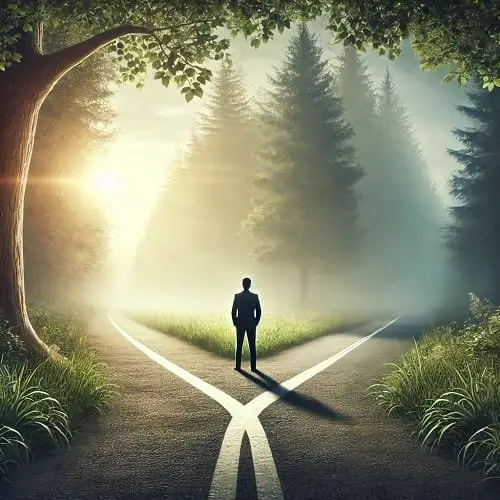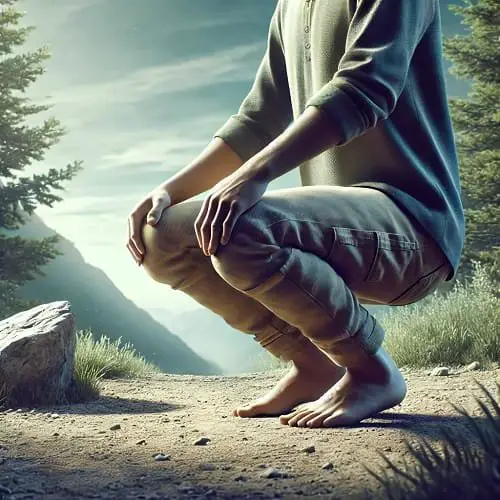Jump to Section
1. Introduction
Intuition vs Anxiety: When it comes to making decisions, you’ve probably experienced that inner voice guiding you toward a particular choice. This voice, often referred to as intuition, can feel like a gut feeling that seems to come from within. But how can you be sure it’s your intuition and not just anxiety playing tricks on you? Understanding the difference between intuition vs anxiety is crucial for better decision-making and emotional clarity.
Intuition is that powerful, subconscious guidance that helps you make decisions without needing logical reasoning. It’s a clear, calm feeling that steers you in the right direction. On the other hand, anxiety stems from fear, stress, or doubt and often clouds your judgment, leading to overthinking or hesitation. Recognizing these two forces is essential because they shape how you approach life’s decisions.
This article will help you trust your instincts and differentiate between intuition and anxiety, so you can make more confident and informed choices. We’ll explore what intuition and anxiety truly mean, how to identify the signs of each, and practical steps you can take to cultivate emotional clarity and trust your gut feelings moving forward.
2. Understanding Intuition and Anxiety

What is Intuition?
Intuition is often referred to as a gut feeling or instinctive decision that arises without conscious reasoning. It’s an immediate knowing or sense of something being right or wrong, without the need for analysis. At its core, intuition is tied to the subconscious mind, which processes information faster than our conscious awareness. This allows us to make decisions quickly and efficiently, based on experiences and patterns we’ve accumulated over time.
For example, you might have had an instance where you walked into a room and instantly felt a sense of peace or discomfort, even though nothing outwardly signaled it. That’s your intuition at work—picking up on subtle cues that your mind processes on a deeper level. These intuitive moments are often calm and reassuring, providing clarity in moments of uncertainty.
What is Anxiety?
In contrast, anxiety is often a response to perceived danger or uncertainty, but instead of clarity, it triggers fear and emotional chaos. Unlike intuition, which typically provides calm, anxiety is fueled by stress and the anticipation of negative outcomes. Anxiety tends to cause confusion, racing thoughts, and emotional responses that create a mental fog.
The emotional and physical symptoms of anxiety can range from a tight chest to feeling overwhelmed, nervous, or even nauseous. Anxiety often arises when we worry about the unknown or fear making the wrong decision, leading to second-guessing. In many cases, anxiety can paralyze you from making decisions, as you become caught in a cycle of overthinking.
Understanding the core differences between intuition vs anxiety can help you better manage your emotional responses, enabling you to make more grounded decisions.
3. Key Differences Between Intuition and Anxiety

Emotional State and Reaction
One of the primary differences between intuition vs anxiety lies in the emotional state they create. Intuition often manifests as a calm, centered feeling. When you experience intuition, it’s like an internal peace that helps you feel emotionally grounded. Your thoughts are clear, and you know what feels right, even in moments of uncertainty. Intuition guides you with clarity, free from emotional chaos. It’s as though your inner self is quietly confident, sending you signals to trust your path.
On the other hand, anxiety tends to stir up emotional turbulence. When you’re anxious, your body and mind react with tension, fear, and stress. It clouds your judgment, making it difficult to think clearly or make decisions. Rather than feeling at ease, anxiety brings unease and discomfort, often causing mental fog and confusion. This emotional disturbance can amplify self-doubt and prevent you from seeing the bigger picture, as your mind gets lost in negative thoughts.
Decision-Making Impact
The impact of intuition vs anxiety on decision-making is profound. When you follow your intuition, decisions come quickly, almost instinctively. You make choices with confidence and trust in your inner wisdom, even when there’s little time to analyze every factor. This kind of decision-making leads to clearer, more aligned actions that reflect your true desires and needs.
Conversely, when anxiety takes over, decision-making is often hindered. Fear-based decision-making results in hesitation, second-guessing, and doubt. Anxiety causes your mind to overanalyze situations, focusing on worst-case scenarios and making you question your choices. Rather than moving forward with confidence, you might find yourself paralyzed by indecision, unable to trust your own judgment. The longer you stay in this anxious state, the more difficult it becomes to make even simple decisions.
How to Tell the Difference
So, how do you distinguish between intuition vs anxiety in everyday situations? It can be tricky, but here are some practical examples and signs to help you tell them apart:
- Gut Reaction vs Mental Overthinking: A clear sign of intuition is a strong gut reaction that feels aligned with your values and goals. Anxiety, however, is often accompanied by excessive overthinking, where you’re trapped in a loop of fear and uncertainty.
- Calm Clarity vs Emotional Turmoil: When you’re experiencing intuition, you feel emotionally stable, even if the situation is complex. Anxiety, however, brings emotional turmoil—like a rollercoaster of fear, stress, and worry.
- Swift Confidence vs Hesitation: Intuition allows for swift, confident decisions, while anxiety creates hesitation and doubt. If you find yourself unable to move forward, it may be a sign that anxiety is at play.
By becoming aware of these subtle differences, you can start to trust your instincts more effectively and avoid being swayed by unnecessary self-doubt or stress. Recognizing when anxiety is holding you back can empower you to make decisions that align with your true desires and values.
4. How Intuition Can Guide You to Better Decisions

Strengthening Your Intuition
To make better, more confident decisions, it’s important to develop and trust your gut—your intuitive sense that can guide you in the right direction. One way to tap into your intuition is through mindful decision-making. Practicing mindfulness helps you quiet the noise of everyday life, allowing you to tune in to your body’s natural signals. By focusing on the present moment, you’re better able to discern whether your thoughts are rooted in calm intuition or clouded by anxiety.
Meditation is another powerful tool for strengthening emotional intelligence and cultivating intuition. Regular meditation practice helps you clear your mind, reduce stress, and improve your ability to listen to your inner voice. As you become more attuned to your emotions and thought patterns, you’ll better recognize when your gut feelings are offering valuable insights versus when anxiety is driving you to second-guess yourself.
Additionally, paying attention to your body’s signals can help you distinguish between intuitive clarity and anxious stress. When you experience intuition, your body feels relaxed and in sync. In contrast, anxiety often triggers physical symptoms like tension or discomfort. By practicing self-awareness, you can learn to interpret these bodily cues and use them as guidance in your decision-making process.
Practical Applications of Intuition
Now that you’ve learned how to strengthen your intuition, it’s time to explore how to apply it in real life. Intuition can be incredibly powerful in situations where you need to make quick decisions with limited information. For example, in a work environment, you may feel an intuitive nudge to take a particular course of action, even though all the data isn’t available yet. Trusting this instinct can often lead to the right outcome, especially when it aligns with your deeper values and past experiences.
In personal relationships, intuition helps you understand when something feels right or when boundaries need to be set. If you have a strong feeling about someone or a situation, that’s often your intuition trying to guide you toward a positive or negative outcome. By learning to trust these subtle feelings, you can navigate social dynamics with more confidence and clarity.
Real-life examples abound where intuition has led people to success, whether it’s starting a new business, pursuing a relationship, or making a significant life change. People who trust their gut often feel more fulfilled and aligned with their goals, as their decisions are in harmony with their authentic selves.
Encourage yourself to listen to your intuition in everyday situations. Whether you’re choosing a new career path, deciding where to travel, or even picking up a new hobby, intuition can lead to decisions that are more aligned with your true desires. With practice and awareness, you can learn to distinguish when it’s your intuition guiding you versus when it’s anxiety clouding your judgment.
RELATED POSTS
10 Signs You Are Recovering from Anxiety: How to Know You’re on the Right Path
Anxiety During Ovulation: Why It Happens and How to Manage It
How TMS Can Ruin Your Life: Risks and Side Effects
Cymbalta Ruined My Life: Understanding the Side Effects
Can Abilify Ruin Your Life? The Risks and Its Side Effects
5. Overcoming Anxiety to Embrace Your Intuition

Recognizing and Managing Anxiety
To fully trust your intuition, it’s essential to recognize when anxiety is creeping in and interfering with your decision-making. Anxiety often manifests as a racing mind, physical tension, or a feeling of dread, which can cloud your judgment. Recognizing these early signs is the first step in reclaiming your mental clarity and making better decisions.
One way to manage anxiety is by identifying the triggers that cause it. These could be specific situations, like making a big decision or dealing with uncertainty, or they could be internal, such as self-doubt or fear of failure. By paying attention to when anxiety arises, you can start to identify patterns and take proactive steps to prevent it from taking control.
Breathing exercises are one effective technique for managing anxiety. Deep, slow breathing helps to calm the nervous system and clear the mind. One simple exercise is the 4-7-8 method: inhale for four seconds, hold for seven, and exhale for eight. This practice encourages relaxation, reduces stress, and creates the mental space needed to listen to your intuition. Additionally, mindfulness practices can help you stay grounded in the present moment, reducing the tendency to overthink or worry about future outcomes.
Developing Emotional Regulation
In addition to managing anxiety, developing emotional regulation is a key factor in making decisions that align with your intuition. When emotions like fear and self-doubt take over, it’s hard to trust your gut feelings. However, by learning to regulate your emotions, you can reduce the influence of anxiety and create a clearer path for intuitive decision-making.
Practicing self-compassion is one powerful way to improve emotional regulation. Being kind to yourself, especially during moments of uncertainty, reduces the inner criticism that often fuels anxiety. When you stop doubting your abilities and start accepting your imperfections, you free yourself from the mental fog that holds you back. Self-compassion allows you to be more patient and forgiving, helping you navigate difficult decisions with more confidence.
Another method to develop emotional regulation is through positive mindset practices. Cultivating optimism and focusing on your strengths can counteract feelings of fear and anxiety. When you approach decision-making with a positive outlook, you create the mental space for clarity of thought and intuitive wisdom to emerge.
By managing anxiety and improving emotional regulation, you can create the ideal conditions to embrace your intuition. Overcoming fear and self-doubt allows you to hear your inner voice more clearly, leading to more informed, confident, and aligned decisions.
6. Practical Exercises to Differentiate Intuition from Anxiety

Grounding Techniques for Clarity
One of the most effective ways to clear anxiety and distinguish it from your intuition is through grounding techniques. These exercises help you connect with the present moment and calm your mind, allowing you to discern whether the feelings you’re experiencing are based on fear or intuitive wisdom.
A simple grounding exercise involves focusing on your five senses. Take a moment to notice what you can see, hear, feel, smell, and taste. This practice can help bring you back to the present and reduce the mental fog created by anxiety. Another grounding technique is the “5-4-3-2-1 method,” where you identify five things you can see, four things you can feel, three things you can hear, two things you can smell, and one thing you can taste. By engaging your senses, you can shift your focus away from anxious thoughts and allow your intuition to come through.
Journaling and Self-Reflection
Journaling is an excellent way to gain insight into your emotions and clarify your gut reactions. Writing down your thoughts and feelings helps you reflect on your emotional state, making it easier to distinguish between intuition vs anxiety. Use journal prompts to guide your self-reflection, such as:
- “What does my gut tell me about this situation?”
- “Am I feeling calm and confident or overwhelmed and fearful?”
- “What’s the worst thing that could happen, and how likely is it?”
These prompts encourage you to explore whether your feelings are based on calm intuition or fueled by anxiety. Journaling also helps you track patterns over time, so you can learn to recognize the signs of each and respond accordingly.
Visualization Exercises
Another powerful way to strengthen your intuition is through visualization exercises. Imagine yourself in a particular decision-making scenario. Visualize both outcomes—one where you trust your intuition and one where you let anxiety lead. Pay attention to how each scenario feels. Does one path feel lighter, more aligned, and more confident? That’s likely your intuition guiding you.
Visualization helps you practice making decisions from a place of emotional clarity. It also builds the confidence you need to rely on your intuition rather than being swayed by anxiety. By incorporating these exercises into your routine, you’ll strengthen your ability to recognize and follow your inner wisdom.
7. Conclusion: Embrace Intuition for a Clearer Path Forward
In conclusion, understanding the difference between intuition vs anxiety is essential for making more confident and informed decisions. Intuition provides a calm, clear path forward, guiding you through decision-making with a sense of emotional clarity and self-assurance. By recognizing when anxiety is influencing your thoughts and distinguishing it from your true inner voice, you can embrace trusting yourself more fully.
We’ve explored practical methods such as grounding techniques, journaling, and visualization exercises that can help you enhance self-awareness and develop a deeper connection to your intuition. By practicing these techniques regularly, you can make decisions from a place of confidence, reducing the impact of self-doubt and emotional turmoil.
Moving forward, remember that your inner voice can be a powerful guide in both your personal and professional life. By trusting your intuition and practicing emotional regulation, you can make decisions that align with your true desires, leading to greater fulfillment and clarity. Stay mindful of both intuition and anxiety, and use the tools discussed to ensure you’re always making confident choices that serve your highest good.
8. Frequently Asked Questions
1. What is the difference between intuition and anxiety?
Intuition is a calm, instinctive sense of knowing that guides decision-making without the need for logical reasoning. It comes from your subconscious mind and provides clarity. Anxiety, on the other hand, is driven by fear, uncertainty, or stress. It creates doubt and confusion, often leading to overthinking and hesitation in decision-making.
2. How can I tell if my gut feeling is intuition or anxiety?
Intuition tends to feel calm, confident, and aligned with your values, while anxiety feels overwhelming, fear-based, and unsettling. If your thoughts are clear and decisive, it’s likely intuition. If you’re caught in a loop of worry and doubt, it’s probably anxiety.
3. Can intuition help me make better decisions than logic?
Yes, intuition can often guide you to better decisions, especially in situations where quick action is needed, and logic alone isn’t enough. Intuition draws from past experiences, emotional intelligence, and deep inner wisdom, offering clarity when there’s not enough data to rely on logic alone.
4. Why does anxiety often feel like intuition?
Both intuition and anxiety are emotional responses, but they have different effects on your decision-making. Anxiety mimics intuition because both can create a strong emotional reaction, but anxiety is rooted in fear and uncertainty, while intuition brings calm and clarity.
5. How can I strengthen my intuition?
To strengthen your intuition, practice mindfulness, meditation, and self-awareness. Pay attention to your gut feelings in everyday situations and journal your experiences. Over time, you’ll become more attuned to your inner voice and able to distinguish it from other emotions like anxiety.
6. What are some common signs of anxiety that cloud decision-making?
Common signs of anxiety include rapid heart rate, shallow breathing, tightness in the chest, racing thoughts, and feelings of doubt or fear. These physical and emotional symptoms often cause indecision or overthinking, which can hinder your ability to make clear choices.
7. Can anxiety be mistaken for intuition in important life choices?
Yes, anxiety can be mistaken for intuition because both can create strong emotional responses. However, anxiety tends to cause confusion, fear, and doubt, while intuition leads to calm, clarity, and confidence in your decision-making.
8. How do I manage anxiety so it doesn’t interfere with my intuition?
To manage anxiety, practice breathing exercises, mindfulness, and self-compassion. Regularly engaging in these techniques can help clear mental fog, reduce stress, and allow your intuition to come through more clearly when making decisions.
9. What is the role of the subconscious mind in intuition?
The subconscious mind plays a key role in intuition because it stores all your past experiences, knowledge, and patterns. When making decisions, your subconscious mind processes these experiences and sends you intuitive signals, guiding you toward the best choices without conscious thought.
10. Are there any exercises to help me differentiate between intuition and anxiety?
Yes, grounding techniques like focusing on your senses, journaling to reflect on your emotional states, and visualization exercises can help you distinguish between intuition and anxiety. These practices bring clarity and help you tune into your body’s signals.
11. How can I trust my intuition when making career decisions?
When making career decisions, listen to your inner voice and assess whether your choice feels aligned with your values and goals. If the decision feels calm and confident, it’s likely your intuition. If you experience uncertainty or fear, it might be anxiety clouding your judgment.
12. Can developing emotional intelligence help me trust my intuition more?
Yes, developing emotional intelligence helps you better understand your emotions, which in turn helps you differentiate between intuitive feelings and anxiety. By becoming more self-aware, you can recognize when anxiety is influencing your decisions and trust your intuition more confidently.
13. How does intuition impact my emotional well-being?
Intuition enhances emotional well-being by helping you make decisions that align with your true desires and values. When you trust your intuition, you feel more in control, reduce self-doubt, and experience greater emotional clarity, leading to better overall well-being.
14. What mental or physical signs should I look for to differentiate between intuition and anxiety?
Mentally, intuition feels clear and focused, while anxiety causes confusion, worry, and racing thoughts. Physically, intuition brings a sense of calm or lightness, while anxiety manifests as tension, restlessness, or a racing heart. Recognizing these signs can help you distinguish between the two.
15. How do mindfulness and meditation help in recognizing intuition vs anxiety?
Mindfulness and meditation help quiet the mind, reduce stress, and bring awareness to your thoughts and emotions. By practicing these techniques, you can tune into your inner voice and better recognize when your feelings are driven by intuition versus anxiety.
16. Why do some people have stronger intuition than others?
Some people may have stronger intuition because they’ve developed a deep connection to their emotions and inner guidance through experience, mindfulness, and self-awareness. Regular practice of listening to their intuition helps them strengthen this ability over time.
17. What is the science behind intuition and how does it differ from anxiety?
Intuition is thought to arise from the subconscious mind, which processes vast amounts of information without conscious awareness. Anxiety, however, is often a response to perceived danger or uncertainty, activating the fight-or-flight response and triggering fear and emotional turmoil.
18. How can I overcome self-doubt when my intuition is guiding me in a direction I fear?
Overcoming self-doubt requires practicing self-compassion and trusting that your intuition is grounded in your deeper knowledge and past experiences. Remind yourself that intuitive feelings are often more accurate than fear-based thoughts and take small steps to build confidence in your decisions.
19. Can trusting your intuition lead to better emotional clarity in decision-making?
Yes, trusting your intuition helps clear emotional confusion and provides clarity in decision-making. When you follow your inner guidance, you feel more aligned with your values, which leads to better decision-making with reduced emotional turmoil.
20. What are the most effective ways to calm anxiety before making an important decision?
To calm anxiety, engage in breathing exercises, practice mindfulness, and take a break from the decision-making process to clear your mind. Engaging in these techniques can help reduce mental fog and stress, allowing you to tap into your intuition and make decisions with greater confidence.
References
- NOCD: Intuition vs. Anxiety: How therapists spot the difference.
- Psychology Today: Is It Intuition or Anxiety?
- The Wellness Society: How Can We Tell the Difference Between Anxiety and Intuition?
ALSO READ
Rooibos Tea for Breastfeeding: Benefits and Safety
Matcha for PCOS: A Green Tea Guide to Better Hormonal Balance
The Ultimate Guide to Macros for Menopause: Key Nutrients for Women
Gastrocnemius Pain After Running: Why It Happens and How to Treat It






